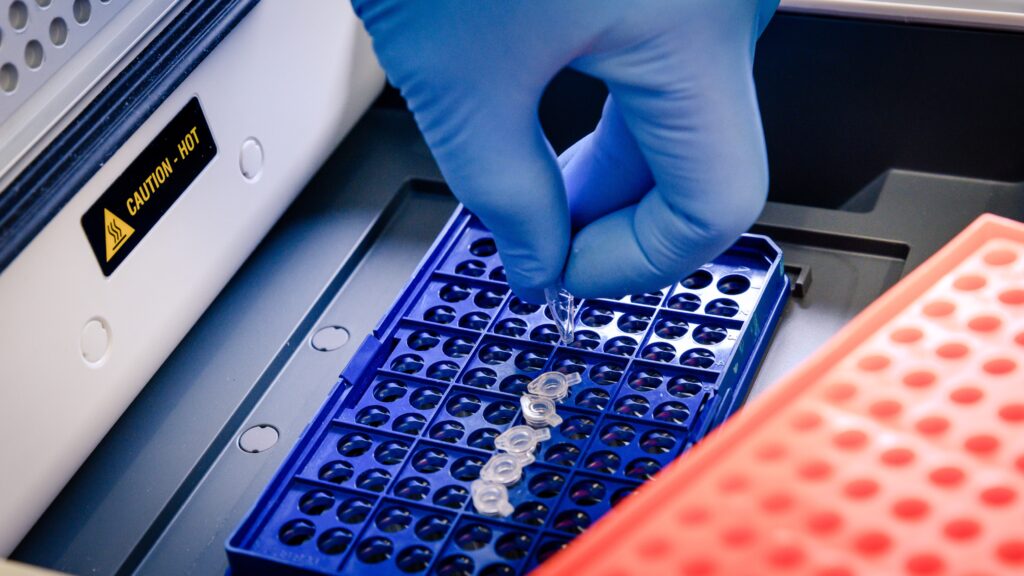At Testogen, we provide advanced Next-Generation Sequencing (NGS) solutions designed to revolutionize precision medicine for cancer and genetic diseases. Our state-of-the-art technologies empower clinicians, researchers, and healthcare professionals with the most accurate and comprehensive genetic insights available.
Uncovering the genetic blueprint of disease for targeted treatments
Whole Exome Sequencing (WES) is a powerful tool for diagnosing inherited genetic disorders and guiding precision medicine strategies. By focusing on the protein-coding regions of the genome, where nearly 85% of disease-causing mutations occur, WES enables faster and more accurate genetic diagnoses.
Applications in Precision Medicine:
Genetic Diseases: WES helps identify pathogenic mutations in rare genetic disorders, such as cystic fibrosis, Marfan syndrome, and hereditary metabolic diseases. Early and accurate diagnosis supports tailored therapeutic strategies and informed genetic counseling.
Cancer: In oncology, WES is used to detect germline mutations in cancer susceptibility genes (e.g., BRCA1/BRCA2 in breast cancer, TP53 in Li-Fraumeni syndrome), allowing early risk assessment and personalized treatment plans.
Pharmacogenomics: WES helps predict drug responses based on genetic variations, optimizing medication choices and minimizing adverse effects.

A comprehensive genomic landscape for precision oncology and genetic medicine Whole Genome Sequencing (WGS) provides the most complete view of a patient’s genetic makeup, detecting single nucleotide polymorphisms (SNPs), structural variants, copy number variations (CNVs), and epigenetic modifications that influence disease risk and progression.
Applications in Precision Medicine
Cancer Genomics: WGS enables tumor profiling by identifying somatic mutations, structural rearrangements, and driver mutations that influence cancer behavior. This information supports personalized treatment strategies, including targeted therapies and immunotherapy selection.
Rare Genetic Disorders: Many genetic diseases arise from complex structural variations that are missed by standard sequencing techniques. WGS provides a high-resolution approach to diagnosing conditions like muscular dystrophies, neurodevelopmental disorders, and mitochondrial diseases.
Hereditary Cancer Syndromes: WGS can detect inherited mutations in multiple cancer-related genes, improving risk prediction and guiding preventive interventions for individuals with a family history of cancer.

Understanding gene expression for personalized cancer therapy and disease diagnostics RNA sequencing (RNAseq) provides a dynamic view of how genes are activated or silenced in different biological states. Unlike DNA sequencing, which focuses on genetic code, RNAseq reveals how mutations affect gene function, making it a critical tool for precision medicine.
Applications in Precision Medicine
Cancer Treatment Personalization: RNAseq identifies tumor-specific gene expression patterns, fusion genes, and alternative splicing events that influence cancer progression. This data helps clinicians select the most effective targeted therapies and immunotherapies.
Biomarker Discovery: RNAseq aids in the identification of novel diagnostic and prognostic biomarkers for cancer, neurological disorders, and autoimmune diseases, improving early detection and monitoring.
Drug Response Prediction: By analyzing gene expression changes in response to therapies, RNAseq supports pharmacogenomic approaches, ensuring optimized treatment regimens with minimal side effects.

Focused genetic analysis for precise diagnostics and treatment selection
Targeted sequencing allows in-depth analysis of specific genes or genomic regions linked to hereditary diseases and cancer, offering a cost-effective, high-depth alternative to whole genome approaches.
Applications in Precision Medicine
Oncology: Targeted sequencing panels are designed to analyze key cancer-related genes (e.g., EGFR, KRAS, BRAF, TP53) for precise tumor profiling, aiding in the selection of targeted therapies and immune checkpoint inhibitors.
Inherited Disorders: Gene panels focused on neurological, cardiovascular, and metabolic diseases help pinpoint disease-causing mutations for early diagnosis and therapeutic intervention.
Minimal Residual Disease (MRD) Monitoring: In hematological malignancies, targeted sequencing tracks low-frequency mutations to assess treatment response and detect relapse earlier than conventional methods.

Revolutionizing cancer detection and treatment monitoring through non-invasive genomics
Circulating tumor DNA (ctDNA) sequencing provides a minimally invasive alternative to tissue biopsies, detecting tumor-derived DNA fragments in the bloodstream. This cutting-edge approach enables real-time monitoring of cancer progression and treatment response.
Applications in Precision Medicine
Early Cancer Detection: ctDNA sequencing identifies tumor-associated mutations at early stages, allowing for timely interventions and improved patient outcomes.
Monitoring Treatment Efficacy: By tracking mutational changes over time, liquid biopsy helps assess therapy response and resistance, guiding adaptive treatment strategies.
Predicting Relapse: ctDNA analysis detects residual disease post-treatment, providing an early warning system for potential recurrence, particularly in lung, colorectal, and breast cancers.

Transforming raw genomic data into actionable insights for precision medicine
Genomic sequencing generates vast amounts of data that require expert interpretation. Our bioinformatics team applies state-of-the-art algorithms, machine learning, and statistical models to extract clinically relevant insights, ensuring high-precision diagnostics and personalized treatment planning.
Applications in Precision Medicine
Variant Interpretation & Disease Correlation: Our bioinformatics pipeline filters and annotates clinically significant mutations, linking them to disease phenotypes and treatment options.
Tumor Genomic Profiling: Advanced computational tools analyze mutational signatures, gene fusions, and neoantigen predictions, guiding oncologists in selecting the most effective therapies.
Genetic Risk Assessment: For hereditary conditions, our analysis provides risk prediction models, supporting preventive healthcare strategies and family planning decisions.

Genetic sequencing is a laboratory process used to determine the order of nucleotides (A, C, G, T) in a person’s DNA. This can help identify mutations or genetic changes that may contribute to cancer or genetic disorders, providing valuable information for diagnosis and treatment planning.
Genetic testing in cancer patients can identify specific genetic mutations in the tumor, which may help determine the best course of treatment. This personalized approach allows doctors to choose therapies that target the specific mutations in the cancer cells, improving the effectiveness of treatment.
Sequencing can detect a wide range of genetic disorders, including inherited conditions like cystic fibrosis, sickle cell anemia, and Duchenne muscular dystrophy. It can also help identify genetic mutations that may predispose individuals to certain conditions like breast cancer or heart disease.
Coverage for genetic testing varies depending on your insurance provider and policy. We recommend contacting your insurance company to confirm coverage for the specific test. Our lab can provide you with a cost estimate in advance.
Your genetic information is kept strictly confidential. We follow all applicable privacy laws and regulations to protect your personal health information. Only authorized individuals involved in your care will have access to your test results.
The results of genetic sequencing typically take anywhere several weeks, depending on the complexity of the test and the sample provided.
Our lab strives to deliver accurate results as quickly as possible to support timely medical decisions.
